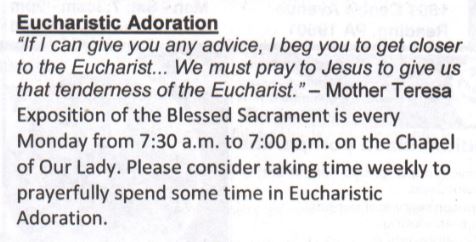
Meditation: Revelation 1:9-13, 17-19
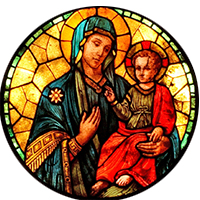
2nd Sunday of Easter or Sunday of Divine Mercy
Do not be afraid. (Revelation 1:17)
It happened just about every time God revealed himself. John had a vision of the risen Jesus, and it made him faint with terror (Revelation 1:17). Isaiah had a vision of the majesty of God, and he cried out, “Woe is me, I am doomed!” (Isaiah 6:5). Ezekiel saw God coming in the clouds, surrounded by rings of fire, and he fell on his face in awe (Ezekiel 1:28).
Even more “ordinary” revelations of God’s holiness had a similar effect. Peter fell to his knees and cried out, “Depart from me, Lord, for I am a sinful man,” after Jesus miraculously filled his nets with fish (Luke 5:8).
These may be dramatic scenes, but what happened next is even more dramatic. Jesus told John, “Do not be afraid,” and then proceeded to give him messages for the churches (Revelation 1:17). Isaiah had his sins purged, and God called him to be a prophet (Isaiah 6:8). Seeing Ezekiel facedown on the ground, God told him to stand up; he just wanted to talk with him (Ezekiel 2:1). And Jesus told Peter, “Do not be afraid,” and then called him to become a disciple (Luke 5:10).
Do you see the pattern? In each story, God made it clear that the person’s past sins and mere mortality didn’t pose obstacles to him. He was more focused on the work he had for them to do.
This is what divine mercy looked like in biblical times, and it’s what it looks like today. It’s God forgiving our every sin, cleansing our consciences, and easing our fears. It’s also God looking with sadness on a darkened, sinful world and sending us out as his ambassadors.
Do not be afraid. Jesus says these words to you today. Don’t be afraid of God. He loves you and he forgives you. And don’t be afraid to share that mercy with the people around you. Forgive them just as you have been forgiven. Let them see in you the merciful face of God.
“Jesus, let the good news of your mercy fill the whole world today!”
Acts 5:12-16
Psalm 118:2-4, 13-15, 22-24
John 20:19-31
Meditation: Mark 16:9-15
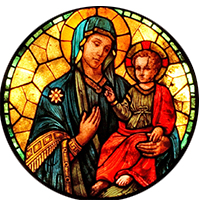
Saturday within the Octave of Easter
They did not believe. (Mark 16:11)
The events of the preceding days had been traumatic. The disciples had watched helplessly as their beloved master was arrested, mocked, and tortured. Then, overcome by fear, they all ran away, abandoning him at his darkest moment. And they remained in hiding, leaving some women to undertake the dangerous role of anointing his body.
When Mary Magdalene came to them claiming to have seen Jesus, they all wondered, “How could this be true?” It was easier to believe that Mary’s account was just wishful thinking born of her sorrow and grief.
Although it is the Easter season, we too may find ourselves struggling to believe that Jesus is truly risen and lives in us. We may want to believe, of course, but sometimes the hard realities of life wear down our faith. Then doubt finds its way into our hearts and minds, and we begin to wonder if God cares about us at all.
If this describes you, take some time today just to look around. There are so many signs that Christ is truly risen. There’s the work of St. Teresa of Calcutta’s Missionaries of Charity, who bring so much love into the world by their care for the poorest of the poor. There’s your pastor or the volunteers in your parish who work tirelessly to serve everyone else. Maybe you know someone who, in spite of terrible suffering, still reflects the peace and comfort of the Lord. Countless stories from the saints and from everyday people prove to us that Jesus really is risen and that he really does live among us.
Then, of course, there’s you. Even if your prayer feels dry right now, think about the times when you have experienced God reaching out to you. When have you felt his presence in a special way? Take some time today to recall some of the amazing ways God has cared for you.
We are an Easter people. So whenever you begin to doubt, you can cry out to Jesus, “Help my unbelief!” (Mark 9:24). Just as he showed himself to the disciples that first Easter, the risen Christ stands ready to show himself to you!
“Jesus, help me to see past my unbelief to the power of your resurrection.”
Acts 4:13-21
Psalm 118:1, 14-21
Meditation: Acts 4:1-12
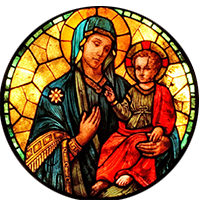
Friday within the Octave of Easter
Then Peter, filled with the Holy Spirit, answered them. (Acts 4:8)
Maybe you’ve noticed this character who keeps appearing throughout Acts. He’s usually in the background, avoiding the limelight. He has almost no speaking parts, and yet he always manages to get in on the action. The evidence of his presence is on every page. He is the Holy Spirit, of course!
Today’s first reading is a perfect example of the major role that the Holy Spirit played in the early Church. When Peter, an ordinary fisherman from Galilee, was filled with the Spirit, he boldly preached to the spiritual leaders of Jerusalem. The Spirit didn’t speak to them directly. Instead, he worked behind the scenes, filling Peter with love for the elders, along with the courage he needed to speak up. And he stayed behind the scenes throughout the story. When Peter opened his mouth to preach, he declared, “Jesus Christ . . . crucified,” not “the Holy Spirit glorified” (Acts 4:10).
You might say that Acts is the Holy Spirit’s “tour de force.” But the Spirit’s role isn’t limited to stories from a bygone era. He is as alive and active today as ever. He wants to play a major behind-the-scenes role in your life too. In fact, he’s already active in you. Every day he gives you evidence of his presence. If you look closely, you can see it in the way God is gradually transforming you and drawing you to himself. If you find it hard to sense his presence, don’t get discouraged. Remember, the Spirit doesn’t shine the spotlight on himself. You can trust that he really is there, working within you. The fact that you are reading this meditation is proof that the Spirit is giving you a desire to know God better!
As he did with Peter, the Holy Spirit wants to soften your heart with love for the people around you. Do you have any resentments toward family or friends? Ask the Spirit to fill you with his mercy. Do you need patience? Ask for it. Do you need more boldness in sharing your faith? Let him give you the courage to talk about what Jesus has done for you. It’s okay to be nervous or unsure of what to say. Just step out, and trust that the Spirit will be supporting you, as he always does.
“Come, Holy Spirit, and fill me with your love and power.”
Psalm 118:1-2, 4, 22-27
John 21:1-14
What’s Your Plan? Sainthood is within your reach, but you need a plan.
BY: FR. JOHN RICCARDO

Here’s a question to consider: do you, right now, have a plan, and are you working at it, so that one day you will become a saint?
Will someone someday want to make a painting or statue of you because of the way you lived your life? We risk misunderstanding the whole point of life if our goal, our plan, is not sainthood. The nineteenth-century French writer Léon Bloy wrote, “The only real sadness, the only real failure, the only great tragedy in life, is not to become a saint.”
A young man, who had just been diagnosed with cancer, made the point of saying, “You know, I live by goals. I’m very successful at my work because I always have goals in front of me. Goals drive me.” Now he realizes he needs new goals. “I need a goal to get through chemo; I need a goal to get through all the treatment. I need some goals that my wife and I can have in front of us going through this, like going on a vacation, celebrating an anniversary.” He’s right. And there’s nothing quite like cancer to wake you up to the fact that as important as all those other goals are, the only real goal, the only ultimate goal that we need to be focused on, is the Omega, which is sainthood. Sainthood is God’s hall of fame, and it’s within your reach. The grace is a given. All it takes is our work and our cooperation with it.
Saints respond to the needs that they see in their time. If Elizabeth Ann Seton hadn’t responded to the need she saw, maybe we wouldn’t have Catholic schools in our country today. If Solanus Casey hadn’t responded to the call of God in his life, perhaps tens of thousands of people would never have encountered the incredibly healing power of God and his love.
Centuries ago, there was a Spaniard named Iñigo who was one of thirteen children. He had no desire whatsoever for God and certainly no desire for holiness. Instead, he was obsessed with attaining personal glory. He was a womanizer, an expert dancer, and a very fancy dresser. His knee was blown apart in a battle, and because he didn’t like the way it had healed—a bone was sticking out and he wanted the ladies to still be attracted to him—he had it rebroken so that it would heal without the bump. While he was convalescing, he asked for some books to be brought to him to pass the time. The only two books available were one on the life of Christ and the other on the saints, so he read them.
And God broke in—and changed everything. The Lord showed him what real glory looks like, what real nobility, real manhood, and real courage looks like. Iñigo changed his name to Ignatius, after St. Ignatius of Antioch, one of the heroes of the early Church, and founded the Society of Jesus (the Jesuits). In the last five-hundred-plus years, literally hundreds of millions of people have come to encounter Jesus through his Spiritual Exercises.
But he’s gone now. So are Solanus Casey and Elizabeth Ann Seton. They have handed the baton to you and to me. And now it’s our turn. It’s our turn to fight the good fight; it’s our turn to run the race; it’s our turn to keep the faith. How do we do that?
There are no shortcuts for the next step. We have to take responsibility for what we’re going to do to respond. We have to come up with a plan, if you will, to accomplish the goal. So it is with sainthood. We need a business plan for sainthood. Now, that might sound strange. How do you plan sainthood? Well, Pope St. John Paul II says that you can. In a letter he wrote, Novo Millennio Ineunte (At the Beginning of the New Millennium), he says this:
Can holiness ever be “planned”? What might the word “holiness” mean in the context of a pastoral plan? . . . To ask catechumens: “Do you wish to receive Baptism?” means at the same time to ask them: “Do you wish to become holy?” It means to set before them the radical nature of the Sermon on the Mount: “Be perfect as your heavenly Father is perfect” (Matthew 5:48). As the Council itself explained, this ideal of perfection must not be misunderstood as if it involved some kind of extraordinary existence, possible only for a few “uncommon heroes” of holiness. The ways of holiness are many, according to the vocation of each individual. . . . The time has come to re-propose wholeheartedly to everyone this high standard of ordinary Christian living: the whole life of the Christian community and of Christian families must lead in this direction. (31)
So what does a plan to become a saint look like? This is something we can’t fudge; we have to write down a plan. Here is a series of things to think about. This is not an exhaustive list; it’s just a way to get us started:
Prayer. What do I consider greatness to look like in prayer? What do I think I need to do every day in terms of prayer to become a saint? Don’t ask the question, “Do I pray enough?” The answer is no—no one prays enough; it’s not possible. But ask, am I praying as much as I should be praying?
Scripture. There is no way I am able to let God form me if I don’t read his word. I have to let him form me, and he forms me through the Scriptures.
Service. Do I reach out of myself? Do I look to volunteer, whether it is in the parish, the local community, or with the poor?
Confession. Do I have as my goal getting to Confession once every two months? If that’s not on your list, I’d start there. And if you haven’t been to Confession in years, just come back. Just come back!
Mass. Obviously, we need to go to Sunday Mass. But ask yourself this: is it possible for me to achieve greatness when I am feeding on the Eucharist only once a week? Once we’ve really come to understand, objectively speaking, that the Eucharist is the greatest source of strength that we could ever encounter in our lives, why wouldn’t we want to come more often? Some of us can’t go to Mass more than once a week because of work. But maybe we can try to get there once during the week, in addition to Sunday. Many people who start coming during the week end up coming every day as they gradually realize, “I just can’t thrive without the Eucharist. I’m not strong enough. I used to think I was, but now I’ve come to realize otherwise.”
Sin. What are the one or two really significant obstacles in my life right now that are keeping me from reaching the goal of sainthood? How am I going to overcome those? Am I just going to say to myself, “Well, that’s just the way I am”? Or am I going to let the Lord change me?
Fasting. Do I ever fast? Jesus doesn’t say, “If you fast . . . ”; he says, “Whenyou fast . . . ” What is my plan for fasting? Some of us can’t fast from food because of health reasons, but we can fast from something else, like the news or the time we spend looking at our computers or cell phones.
Alms. Do I give alms? Do I look at the resources that I have as a means by which I can share with the poor? Pope Francis is constantly reminding us of our obligation to do what we can to help the poor. He wants us not just to care for them so that they simply receive our mercy but, instead, to lift them up and set them on their feet and get them on their way. That’s what he’s encouraging us to do.
In the weeks ahead is to ask yourself, “Do I have a plan to become a saint?” And if you don’t, what is your plan going to look like? Then start working on it. Let’s do the work! You’ll be amazed at how helpful it is.
Questions for Reflection and Discussion
1. What is the goal of your life? Have you ever thought that your goal should be to become a saint? Why or why not?
2. Who is your favorite saint and why? How might you emulate that saint?
3. Do you have a plan to become a saint? If so, what is it? If not, what might it include?
Meditation: Luke 24:35-48
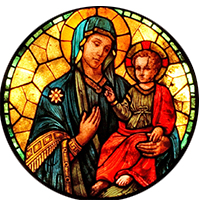
Thursday within the Octave of Easter
He showed them his hands and his feet. (Luke 24:40)
In many of the resurrection stories in the Bible, Jesus makes it a point to prove to the apostles that he is not just a ghost. He walks long distances with them, eats breakfast with them, and invites them to probe his wounds. Clearly he wanted them to be sure that he had truly risen from the dead.
But there’s another reason why Jesus wanted his apostles—and us—to know he rose bodily. He wanted to show us how important our own bodies are. He wanted us to see what we would be like when we rise from the dead at his Second Coming.
This truth of our bodily resurrection is central to our faith. It’s so essential, in fact, that St. Paul says Christianity would not exist without it. “If the dead are not raised,” he wrote, “neither has Christ been raised, and if Christ has not been raised, your faith is vain” (1 Corinthians 15:16-17).
You see, the “resurrection of the body” that we profess in the Apostles’ Creed tells us that our bodies, imperfect or ailing though they may be, are precious to God. When Jesus became man, he healed the sick and fed the hungry as a sign of his care for every part of who we are. He will raise up everything about us, including our ability to see, hear, taste, touch, and smell all the beauty he has created in this world.
This is also why Jesus gives himself to us physically in the Eucharist and why he sends his people out to take care of each other in hands-on ways. He wants everyone to know how much he treasures them—all of them.
This is the good news of the gospel: God cares about every part of your life, including your body. He loves you so deeply that he promises to restore you to the fullest, most perfect version of yourself when he comes again. And that includes both your body and your soul.
Let this hope lift up your heart today. Maybe you could even take a look at yourself in the mirror and say, “This is who I am, and Jesus wants to raise me up. Every part of me!”
“Jesus, thank you for giving me a body that reveals your glory. I trust you with my physical needs, today and always.”
Acts 3:11-26
Psalm 8:2, 5-9
Meditation: Luke 24:13-35
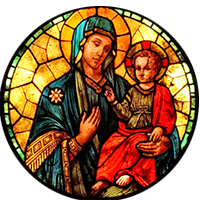
Wednesday within the Octave of Easter
Their eyes were opened and they recognized him. (Luke 24:31)
It had been a long day of walking, but Cleopas and his friend wanted more time with their traveling companion. The mysterious stranger seemed ignorant of the turmoil of the past days, but he could explain the Scriptures like no one they had ever heard before. Wanting to hear more, they urged him, “Stay with us” (Luke 24:29). So he stayed and shared a meal. Then, with a simple gesture and a simple prayer, he broke the bread and gave it to them. And suddenly, their eyes were opened: they recognized their broken Lord, their risen Lord.
Imagine what must have flashed through their minds: “Wait—that’s what Jesus did! Could this be him?” They had more than just a hunch or a guess, though; they felt certain that it was Jesus. It was Jesus, who had broken bread, saying, “This is my body” (Mark 14:22). It was Jesus, who prayed, “Father, forgive them” as he hung on the cross (Luke 23:34). It was Jesus, whose promise to rise from the dead shone in their hearts once again. All this came flooding back to them in the moment when he broke the bread.
In the early Church, the entire Eucharistic celebration was referred to as the breaking of the bread. That’s how important this gesture was. And today, two thousand years later, we still consider the moment when the priest breaks the Host as one of the most solemn parts of the Mass. It’s at that moment that we can recognize Jesus in the Host—the same Jesus who walked with the disciples on the road to Emmaus.
What do you see when the bread is broken? Do you see the broken body of the Crucified One who died to bring us back to his Father? Do you see the Risen One who overcame the power of death and who has opened the gates of heaven to you? He is there, every time, ready to give himself to you in love.
If you struggle to see Jesus, you’re in good company. The Emmaus disciples couldn’t recognize him right away either. But just as Jesus revealed himself to them, he can open your eyes too. So when the priest breaks the bread and says, “Behold, the Lamb of God,” ask Jesus to open your eyes and your heart. That’s a prayer God will always answer.
“Lord, help me to see you more clearly in the breaking of the bread.”
Acts 3:1-10
Psalm 105:1-4, 6-9
A Year of Grace and Favor Jesus’ mercy is for every aspect of our lives.

ave you ever noticed how much the Bible talks about the mercy of God? Even the Old Testament, which is often thought to portray Yahweh as a God of wrath and judgment, is filled with testimonies to his tender love for his people.
At first, we might think that these statements speak only about God forgiving our misdeeds. Yet, God doesn’t just want to pardon us. He loves us so much that he wants to bring us to the fullest experience of life possible. Our heavenly Father wants to wipe out every trace of darkness in our hearts so that we can be filled to overflowing with his love.
As we live from day to day, it can be easy to reduce the gospel message to a series of dos and don’ts. We can begin to think that our efforts alone are enough to earn us a place in heaven. But Scripture teaches us something different: “God so loved the world that he gave his only Son so that everyone who believes in him may not perish but may have everlasting life”’ (John 3:16). This is the heart of the gospel message: Without Jesus, we are helpless and unable to heal ourselves.
The story of Jesus’ raising of Lazarus (John 11:1-44) gives us a compelling illustration of our need for God’s mercy. Throughout the story, John goes to great lengths to emphasize Lazarus’ state. He tells us that, upon hearing that Lazarus was sick, Jesus decided not to go to him right away. Instead, he waited two more days before setting out (11:6). Then, by the time Jesus arrived, Lazarus had already been buried for four days. John left no room for doubt: Lazarus was dead and his body was beginning to decay.
Lazarus couldn’t do anything for himself. He couldn’t ask Jesus for help. He couldn’t pray. He couldn’t seek healing. He couldn’t go to the synagogue or fast or perform works of mercy. Lazarus was 100 percent dead, and Jesus brought him back to life without any help from him at all.
God wants us to understand that we are like Lazarus. He wants us to know deep in our hearts that Jesus has raised us from death to life. This point of faith is crucial to our growth. If it weren’t for the cross, we would all be like Lazarus – 100 per cent dead in sin (Ephesians 2:5). We were saved by the mercy and love of God. It is by his grace that we were raised up. We didn’t earn it. We didn’t deserve it. We have only received it.
In the Gospel of Luke, we read about a sinful woman who burst into the home of Simon the Pharisee and began weeping tears of love and repentance at Jesus’ feet. As she poured out her tears on Jesus, Jesus poured out his mercy upon her. Such an extravagant gift of love from a “sinner” and such a merciful response from Jesus shocked Simon and caused him to question Jesus’ godliness (Luke 7:39).
Simon thought that Jesus was a wise man and he wanted to hear his words. But because he couldn’t recognize his need for Jesus’ mercy and forgiveness, he missed out on the life and love that Jesus was offering him. On the other hand, the woman believed that Jesus could release her from death. As a result, she was open to a life-changing experience of mercy and love.
This is a truth that we recall and rejoice over every time we celebrate Mass. According to the Catechism, at Mass “the one sacrifice of Christ the Savior” is made present to us (CCC, 1330), and in response we proclaim, “Dying, you destroyed our death. Rising, you restored our life.” We freely and clearly proclaim the mercy that Jesus has for us. We freely and clearly proclaim that we could never have saved ourselves.
Scripture is filed with examples of people who, like this repentant woman, experienced the mercy of Jesus. During a conversation with Jesus as they sat by a well, a Samaritan woman came to know his forgiveness and accepted him as the Messiah (John 4:1-26). After he invited Matthew the tax collector to become a disciple, Jesus dined at his house in the company of a host of tax collectors and “sinners” – and he offered forgiveness and salvation to everyone present (Matthew. 9:9-13).
Jesus’ mercy was not limited to forgiving people’s sins. He was concerned for every aspect of their lives. He had mercy on those suffering from physical problems, like blind Bartimaeus, whose sight Jesus restored (Mark 10:46-52). When a leper said, “Lord, if you choose, you can make me clean,” Jesus replied, “I do choose” – and healed him (Matthew 8:24). Even a Roman centurion—a pagan—asked Jesus to heal his servant, and Jesus did, without even going to see the servant or lay hands on him (Matthew 8:5-13).
Jesus also had mercy on those mourning the death of a loved one. He raised Jairus’ daughter from the dead (Mark 5:40-42). He wept at the tomb of his friend Lazarus and then brought him back to life (John 11:35, 43-44). He had compassion for a grieving widow whose only son had just died. Telling her, “Do not weep,” he raised the young man from the dead and gave him back to her (Luke 7:11-16).
Jesus also had mercy on families needing deliverance. The Syrophoenician woman pleaded with him on behalf of her possessed daughter, and the little girl was set free (Matthew 15:21-28). The father of a boy gripped by a demon begged for help. Jesus not only delivered his son but helped the father’s own weakness of faith (Mark 9:23-26). Jesus always showed mercy on those who sought him out.
Two thousand years ago, Jesus revealed the mercy of God through his words and actions. He was the source of mercy for everyone who turned to him and believed in him. Today, Jesus is still our greatest source of mercy. Do you believe that the risen and glorified Jesus can bring the historical events of the gospels to life in your heart today? Do you believe that the Holy Spirit wants to flood your heart with an experience of the mercy that is written about in so many of the gospel stories? All God asks is that you fix your eyes on Jesus in prayer, in Scripture, and at Mass.
The Holy Spirit wants to use the gospel stories to burn an indelible mark of God in our hearts. For example, as we read the story of the woman caught in adultery (John 8:1-11), the Spirit wants to show us that we, too, are capable of sinning just like this woman, or that we are capable of acting just like the men who wanted to stone her. This indelible mark of the Holy Spirit convinces us that no sin is too big for God to forgive. If Jesus is willing to forgive us from every sin, we should be willing to forgive others just as freely.
Meditation: Acts 2:14, 22-33

Monday within the Octave of Easter
The patriarch David . . . foresaw and spoke of the resurrection of the Christ. (Acts 2:29, 31)
Think about a priest giving a homily about the resurrection of Christ. You would likely expect him to talk about the empty tomb and the victory Jesus won over sin. But in today’s reading, Peter talks about something different. He says the resurrection proves that Jesus is the Christ, the Messiah. Why?
Put yourself back into first-century Palestine. God had promised to send his anointed one (which is what the words “messiah” and “Christ” mean). He would establish an eternal kingdom, so the Israelites were longing for this Messiah. Because they were suffering under Roman domination, they expected the Messiah to liberate them from Rome and restore them to the glory of Solomon’s kingdom.
That’s why Peter was so excited to proclaim Jesus as the Messiah. God’s promises had been fulfilled. Jesus is God’s Holy One who was not abandoned to the netherworld. He is the everlasting king that David spoke about. But to their surprise, he did not come as an earthly king who would rescue God’s people from a particular problem they were having. He came to save them from the problem, the source of all oppression and suffering. He came to save them—and everyone—from sin. And he did that by dying to sin on the cross and by opening heaven to them in his resurrection.
You probably didn’t grow up longing for a messiah in the same way the ancient Israelites did. But still, your longings might be similar. Maybe you are looking for Jesus to solve a problem for you or to deliver you from a particularly difficult situation. Maybe somewhere deep down, you believe that following him should give you health and prosperity.
Just as he did back then, Jesus wants to upend your expectations now. He wants to release you from sin so that you are freer to love. He wants to restore you to your Father in heaven so that you can live in confidence, no matter your situation. He wants to help you overcome whatever drags you down so that you can be filled with his joy and peace.
Let Jesus do this for you, and you’ll know a freedom that far surpasses anything this world can offer.
“Come, Lord Jesus, and give us your freedom!”
Psalm 16:1-2, 5, 7-11
Matthew 28:8-15
Bombings in Sir Lanka
On this day when we celebrate Jesus’ triumph over death, we are also saddened by the news of the church bombings in Sri Lanka. May the angels escort all the victims to the throne room of the Lord, and may the Holy Spirit give comfort and solace to all the victims’ loved ones.
For all those affected by this tragedy, today’s second reading has taken on a new meaning: “You have died, and your life is hidden with Christ in God. When Christ your life appears, then you too will appear with him in glory” (Colossians 3:3).
May we all keep our eyes fixed on the risen Lord today. May we set our hearts on the promise of eternal glory that he has made possible by his resurrection.

